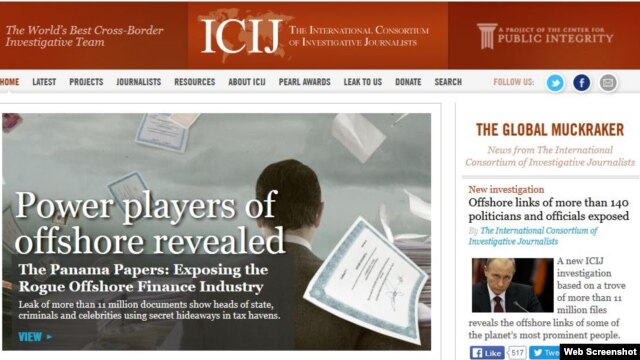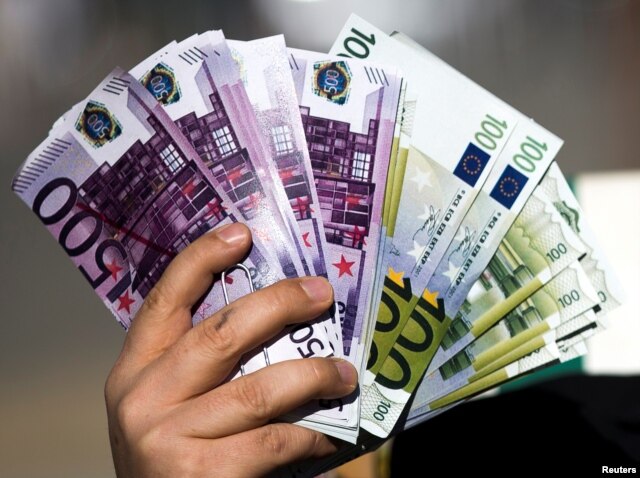World Bank Director: Panama Papers Revelations Hurt Economies
News / Economy
World Bank Director: Panama Papers Revelations Hurt Economies
Screen grab of website for the International Consortium of Investigative Journalists, which reported on the Panama Papers, likely the biggest leak of inside information in history.
April 14, 2016 7:00 PM
The Panama Papers revelations are hurting public trust and may make ordinary citizens more reluctant to pay the taxes needed to fund roads, schools and other government functions, says the second-ranking official at the World Bank.
World Bank Managing Director Sri Mulyani Indrawati calls on policymakers to cooperate by crafting some stronger laws.
Information leaked from a law firm based in Panama showed the efforts of wealthy people around the world to hide money and avoid taxes.
Sri Mulyani says the perception of unfairness damages public trust, crimps government revenue, and slows the economies of some nations that badly need growth.
"When the countries see that some of the leaders, elite or in this case, the rich people, have accounts outside, then they start questioning why. And they are asking about: 'Is it really a legitimate reason?' Or 'is there anything hiding?'"
The money sheltered in Panama also represents a big chunk of some countries' economies.
An activist shows fake banknotes during a demonstration outside the European Commission (EC) headquarters ahead of statements by the EC on the effectiveness of existing measures against tax evasion and money-laundering in light of the recent Panama Paper revelations, in Brussels, Belgium, April 12, 2016.
Tom Cardamone of the research and advisory group Global Financial Integrity says, "Over a trillion dollars in illicit money is siphoned out of developing country economies every year. This is far more than all the foreign aid and all the foreign investment that goes into these countries every year."
Sri Mulyani says that in order to make real change, countries will have to work closely together. "Without international cooperation, it is going to be very hard to actually chase this tax avoidance," she said.
Progress For Women
Sri Mulyani was previously Indonesia's finance minister, the first female to serve in that post, and is now the highest ranking woman in the history of the World Bank. She says it is important for women to show that they can do jobs as well, or even better than men in traditionally-male dominated fields like finance.
Sri Mulyani says she has made a lot of progress, but there is a long way to go before all women get a chance to reach their full potential. She advises young women to "push your boundaries" to make things better for this generation and the next.
With that in mind, the bank is working on projects to improve opportunity for women and expand education programs for girls.
Sri Mulyani says expanding opportunities for women can significantly boost economic growth for some nations by expanding the pool of talented, well-prepared members of the work force.
Helping Refugees
Reducing other kinds of inequality, particularly in economic areas, could help reduce the pressure on people to leave homes in troubled lands and become refugees.
Sri Mulyani says weakening global growth is compounding economic pressures in many nations, including 40 fragile counties. She says work is underway to improve the climate for business to create more jobs, bolster basic services and rebuild social services in countries affected by conflict. She says many of these efforts focus on programs to help young people learn marketable skills.
Sri Mulyani also says refugee destination nations need help because they are bearing an expensive burden for their neighbors
China's Transition
Sri Mulyani says China is undergoing a "complex and quite delicate" transition from an economy dependent on exports and investments to a more market-oriented and consumption-driven model. She calls this one of the most important changes in the global economy, one that will influence the way other nations make similar changes. She says the size of the change coupled with the size of the economy will ripple through the global economy.
While the changes are causing problems for China and other nations, Sri Mulyani says there are also benefits, including using less energy, creating less pollution, and more sustainable growth.
For workers, the transition is also making it possible to move from simple, low paying jobs to ones that add more value to the economy and pay better. But the transition from manufacturing to the service sector can be difficult.
Watch: VOA interview with Sri Mulyani Indrawati, World Bank managing director




Comments